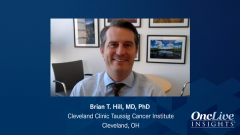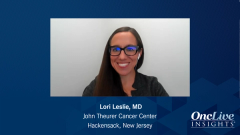
Novel Third-Line Therapies for Relapsed/Refractory Follicular Lymphoma
A comprehensive overview of the third-line treatment armamentarium for patients with relapsed/refractory follicular lymphoma.
Episodes in this series

Transcript:
Lori Leslie, MD: When you get to third-line settings for treatment options and relapsed/refractory for follicular lymphoma [FL], we have many types of therapy that can be discussed. CD19 CAR [chimeric antigen receptor] T-cell therapy is 1 option. We have 2 FDA-approved options that are CD19 CAR T-cell products: axicabtagene-ciloleucel and tisagenlecleucel. Axicabtagene-ciloleucel was approved in March 2021 based on the results of the ZUMA-5 study, which looked at axicabtagene-ciloleucel in patients with relapsed/refractory follicular lymphoma. This study demonstrated an objective response rate of 94% and a CR [complete response] rate of 80%. Longer-term follow-up data suggest that these responses are durable, with a median PFS [progression-free survival] of 40 months recently presented. However, unlike DLBCL [diffuse large B-cell lymphoma], because of the nature of indolent non-Hodgkin lymphoma, it’s still uncertain if CAR-T can be curative in a subset of patients. How to select patients to get CAR T-cell therapy earlier vs later in their treatment landscape remains uncertain in this more chronic disease.
The second construct, tisagenlecleucel, is also a CD19 CAR T-cell therapy. It was approved by the FDA for relapsed/refractory follicular lymphoma in May 2022. This was based on the ELARA study, which showed the activity of tisagenlecleucel in relapsed/refractory follicular lymphoma had an objective response rate of 86%, a CR rate of 69%, and at the last follow-up a 6-month PFS rate of 76% was reported as well. Importantly, the incidence of more severe toxicity, including cytokine release and neurological events, were relatively low in the ELARA study, and a proportion of patients were able to proceed with CAR T-cell therapy in the outpatient setting. This is important when we’re thinking about a patient who’s in front of us about administering CAR T-cell therapy, whether it’s an inpatient process or an outpatient process.
The next therapy I’ll discuss in relapsed/refractory follicular lymphoma is the EZH2 inhibitor tazemetostat. This is an epigenetic modifier and inhibits EZH2, both mutant and wild type. Mutant and wild-type EZH2 are important in the pathobiology of follicular lymphoma. EZH2 locks the follicular B-cell into the germinal center. Inhibition of EZH2 allows for differentiation and germinal center ... In a phase 2 study, patients with relapsed/refractory follicular lymphoma—that included patients with grade 1, 2, 3a, and 3b disease—has ... effects that was found to have an objective response rate of 69% and 35% in AZH2-mutant and wild-type follicular lymphoma, respectively. The PFS was 12 to 14 months across those 2 groups. Importantly, the toxicity profile was quite favorable, with a very low rate of grade 3 or higher adverse events. The approval is for patients with EZH2 mutation and at least 2 prior lines of therapy for FL or patients with relapsed/refractory FL and any prior number of therapies—1 or more—who have no other acceptable treatment option. That’s because of this favorable toxicity profile. Looking at the future, many ongoing studies are looking at tazemetostat combination with other agents in FL.
The next group of agents that are very appealing in FL are the PI3 kinase inhibitors. Unfortunately, this class of drug has been plagued by the toxicity profile. Recently, there were 4 FDA-available PI3 kinase inhibitors for use in relapsed/refractory FL, 3 of which—all oral agents—have recently had their approvals withdrawn, based on absence of confirmatory data after an accelerated approval or toxicity concern. The only available PI3 kinase inhibitor remaining in the treatment landscape for FL is alpelisib, which is an IV PI3K inhibitor. It was approved based on the KRONOS study. The toxicity profile of alpelisib is a little different from the oral PI3 kinase inhibitors. It has more of a metabolic toxicity profile, with infusion-related hyperglycemia and hypertension as potential adverse effects. This is an IV therapy given weekly until progression or unacceptable toxicity. It’s a different approach from some of the oral therapies or CAR T-cell therapies that are also in this space. The CHRONOS-1 study showed an objective response rate of 50% to 60% and a PFS of about 12 months.
Transcript edited for clarity.






































